Unit 10 You're supposed to shake hands. Section A (1a—2d) 课件 (共20张PPT)
文档属性
| 名称 | Unit 10 You're supposed to shake hands. Section A (1a—2d) 课件 (共20张PPT) |  | |
| 格式 | pptx | ||
| 文件大小 | 8.6MB | ||
| 资源类型 | 教案 | ||
| 版本资源 | 人教新目标(Go for it)版 | ||
| 科目 | 英语 | ||
| 更新时间 | 2025-02-08 09:32:22 | ||
图片预览

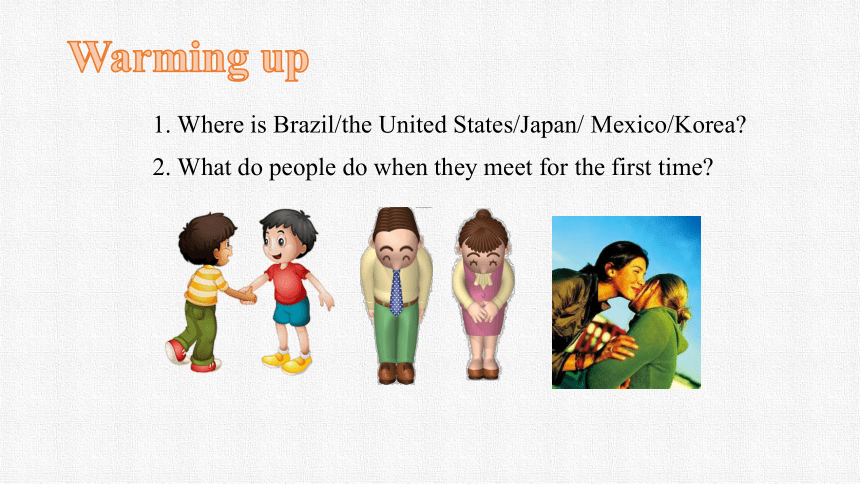
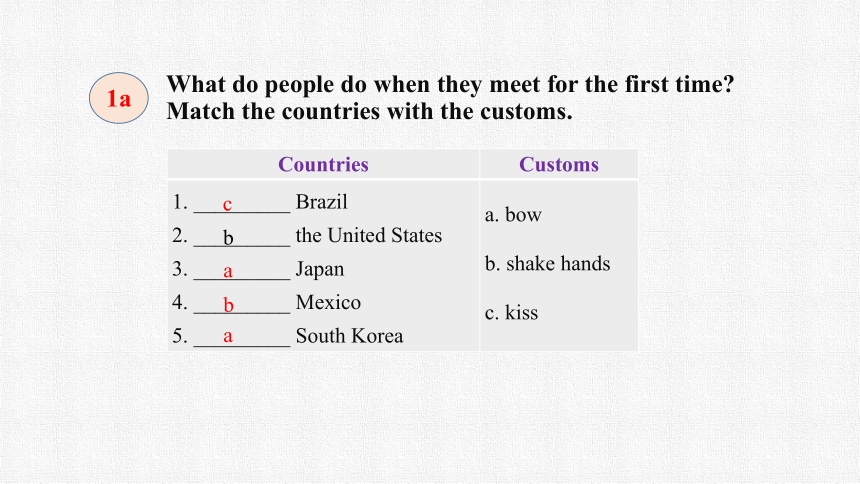
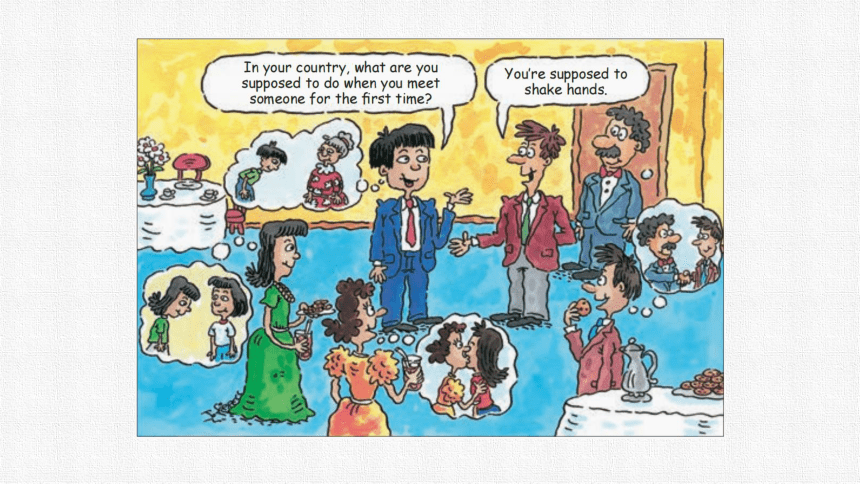
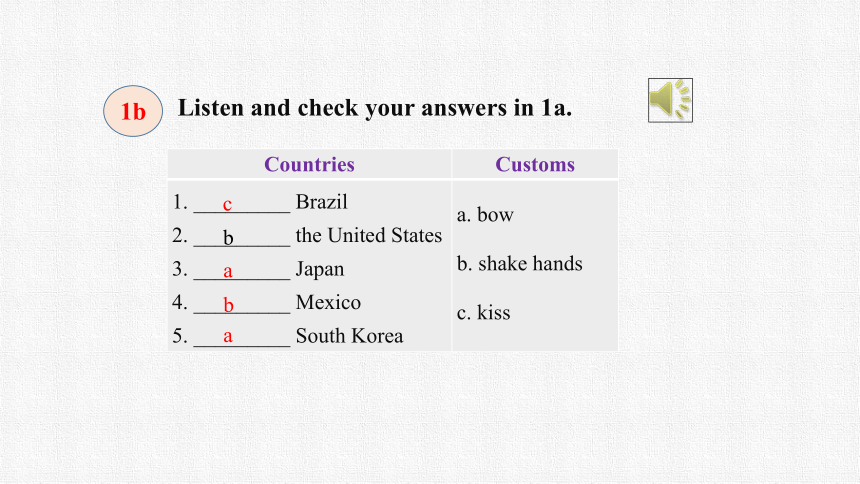
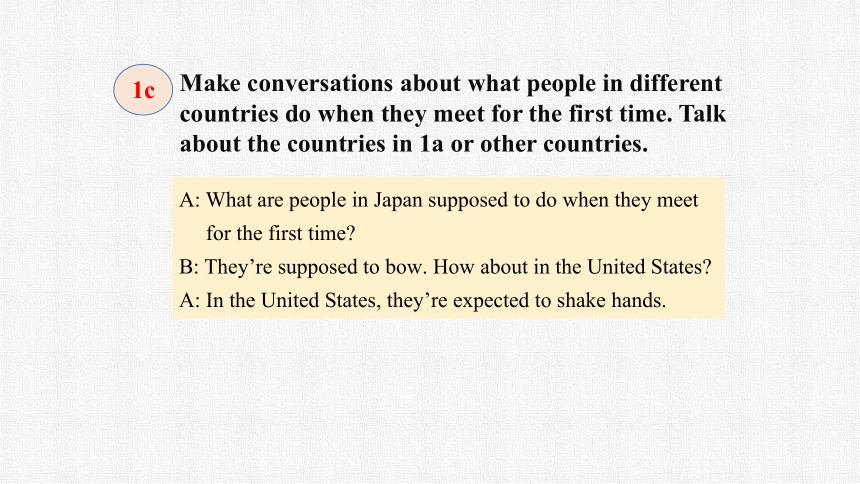
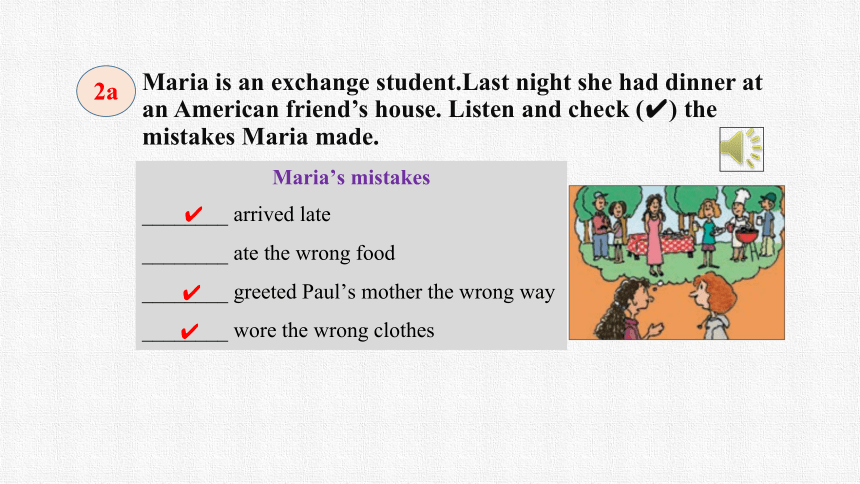
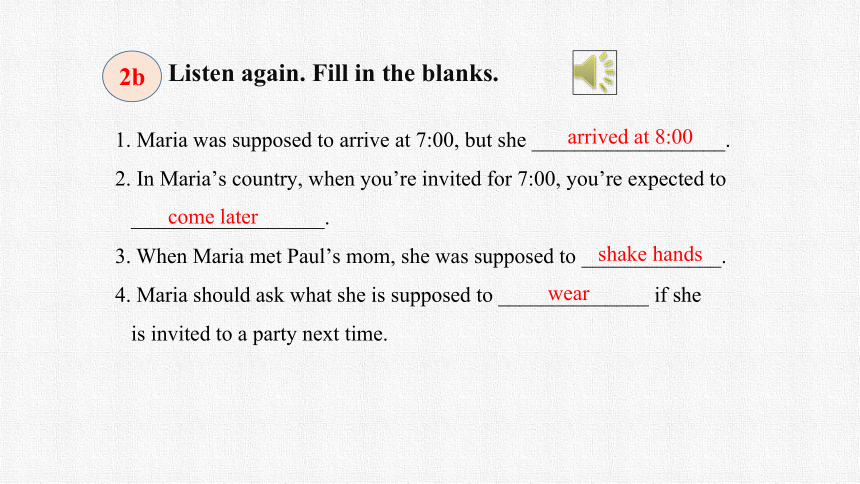
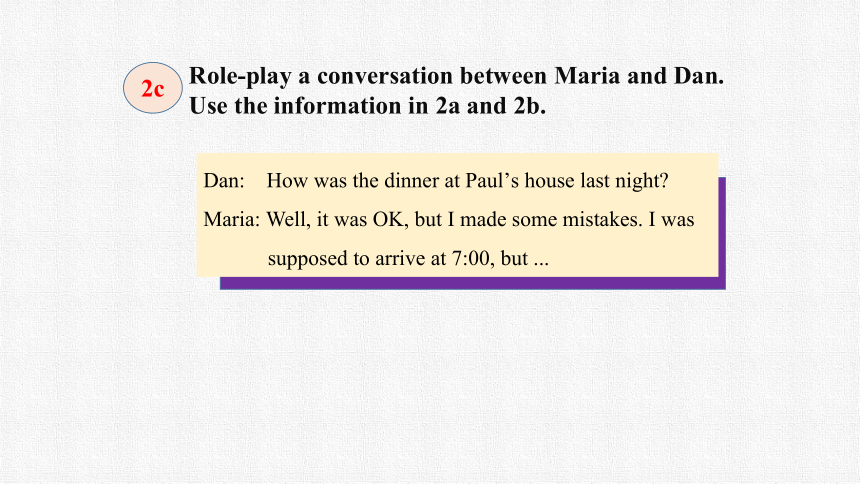
文档简介
(共20张PPT)
Unit 10 You’re supposed to shake hands.
The First Period
Section A(1a—2d)
Warming up
1. Where is Brazil/the United States/Japan/ Mexico/Korea
2. What do people do when they meet for the first time
What do people do when they meet for the first time Match the countries with the customs.
Countries Customs
1. _________ Brazil 2. _________ the United States 3. _________ Japan 4. _________ Mexico 5. _________ South Korea a. bow
b. shake hands
c. kiss
b
c
a
b
a
1a
Listen and check your answers in 1a.
1b
Countries Customs
1. _________ Brazil 2. _________ the United States 3. _________ Japan 4. _________ Mexico 5. _________ South Korea a. bow
b. shake hands
c. kiss
b
c
a
b
a
A: What are people in Japan supposed to do when they meet
for the first time
B: They’re supposed to bow. How about in the United States
A: In the United States, they’re expected to shake hands.
Make conversations about what people in different countries do when they meet for the first time. Talk about the countries in 1a or other countries.
1c
Maria’s mistakes
________ arrived late
________ ate the wrong food
________ greeted Paul’s mother the wrong way
________ wore the wrong clothes
Maria is an exchange student.Last night she had dinner at an American friend’s house. Listen and check ( ) the mistakes Maria made.
2a
1. Maria was supposed to arrive at 7:00, but she __________________.
2. In Maria’s country, when you’re invited for 7:00, you’re expected to
__________________.
3. When Maria met Paul’s mom, she was supposed to _____________.
4. Maria should ask what she is supposed to ______________ if she
is invited to a party next time.
arrived at 8:00
come later
shake hands
wear
Listen again. Fill in the blanks.
2b
Dan: How was the dinner at Paul’s house last night
Maria: Well, it was OK, but I made some mistakes. I was
supposed to arrive at 7:00, but ...
Role-play a conversation between Maria and Dan. Use the information in 2a and 2b.
2c
Katie: How was the welcome party for foreign students last night
John: Great! I made some new friends. But a funny thing happened.
Katie: What
John: I met a Japanese boy called Sato, and as soon as I held out my
hand, he bowed.
Katie:That’s how people in Japan are expected to greet each other. It’s
impolite if you don’t bow.
Role-play the conversation.
2d
John: I didn’t know that. So I just stood there with my hand out. Finally, I
returned the bow.
Katie: I remember when I first met Marie last year, I did the same thing. I
held out my hand and to my surprise, she kissed me on both sides
of my face!
John: I wouldn’t mind that!
Katie: Very funny. Later I found out French
people are supposed to kiss when they
see each other.
1.Where is Sato from
Sato is from Japan.
2.What are French people supposed to do when they
see each other
French people are supposed to kiss when they see each other.
Answer the questions.
1. In your country, what are you supposed to do when you meet someone for the first time 在你们国家,当你初次与某人见面时你应该做什么?(教材第73页)
be supposed to 意为“应该”,后接动词原形,相当于should 或ought to,用来表示劝告、建议、义务、责任等。其否定形式为 be not supposed to 意为“不应该”。
e.g. We are supposed to be here at six. 我们应该6点钟到达这里。
Children are not supposed to play soccer on the street. 孩子们不应该在
大街上踢足球。
Language Points
2. In the United States,they’re expected to shake hands.在美国,他们应该握手。(教材第73页)
(1) be expected to do sth. 意为“(某人)被期望做某事;应该做某事”,此处相当于 be supposed to do sth.。
e.g. You’re expected to get good grades this term. 本学期你应该取得好成绩。
(2) expect 及物动词,意为“期望;预料;期待”,后可接名词、代词、动词不定式或从句。其常用结构:expect to do sth. 意为“期待做某事”;expect sb. to do sth. 意为“期待某人做某事”。
e.g. I expect a letter from my family. 我期待一封家书。
She expected to come back next week. 她预计下星期回来。
I expected you to do your duty. 我期望你能尽职尽责。
I expected that I’ll back on Sunday. 我预计星期天回来。
3. He greeted Paul’s mother the wrong way. 他问候保罗母亲的方式不对。(教材第 74 页)
(1) greet 及物动词,意为“和……打招呼;迎接”,相当于 say hello to sb.,后接名词或代词作宾语。
e.g. We greeted her by saying “Good morning”. 我们向她打招呼,说“早上好”。
(2) the wrong way 意为“以错误的方式,错误地”,相当于 in the wrong way。当 way 构成的短语表示“用……方式/方法”时,常加介词 in。如果 way 前有 this, that 或 the 等词时,in 可以省略,但是如果位于句首,in则不可省略。
e.g. You understood him (in) the wrong way. 你误解他了。
4. I held out my hand and to my surprise, she kissed me on both sides of my face! 我伸出手(想要握手),可令我吃惊的是,她亲吻了我的两颊!(教材第74页)
to one’s surprise 意为“使/让某人吃惊的是”。其中 surprise 用作名词,意为“惊奇,诧异”。
e.g. To my surprise, she got a perfect score in the English exam. 使我吃
惊的是,她在英语考试中得到了很好的成绩。
I have a surprise for you. 我要告诉你一件意想不到的事。
【拓展】(1) in surprise 惊奇地
e.g. Rose looked at her mother in surprise. 罗丝惊奇地看着她母亲。
(2) be surprised at ... 对……感到吃惊
e.g. We are very surprised at the news. 我们对这个消息感到吃惊。
(3) be surprised to do sth. 做某事令人感到惊讶
e.g. I was surprised to see you here. 在这里见到你我很惊讶。
一、语篇填空之基础训练
1. Students are supposed to __________ their teachers when classes
begin.
2. I guess hugs and ________ are only used between close friends.
3. There are different __________ in different countries.
4. People in Japan are supposed to __________ when they meet for
the first time.
greet
kisses
customs
bow
Exercise
kiss greet custom bow
二、根据汉语意思完成句子,每空一词
1. 当你遇到一个陌生人的时候,你应该怎么做?
What __________ you __________ to do when you meet a
stranger
2. 他这次没有犯错误。
He didn’t __________ __________ __________ this time.
3. 我一到北京就给你打电话。
I will call you _______ ________ ________ I arrive in Beijing.
4. 他以错误的方式和玛丽的妈妈打招呼。
He greeted Mary’s mother ________ ________ ________.
are
supposed
make
any
mistakes
as
the
wrong
way
soon
as
Unit 10 You’re supposed to shake hands.
The First Period
Section A(1a—2d)
Warming up
1. Where is Brazil/the United States/Japan/ Mexico/Korea
2. What do people do when they meet for the first time
What do people do when they meet for the first time Match the countries with the customs.
Countries Customs
1. _________ Brazil 2. _________ the United States 3. _________ Japan 4. _________ Mexico 5. _________ South Korea a. bow
b. shake hands
c. kiss
b
c
a
b
a
1a
Listen and check your answers in 1a.
1b
Countries Customs
1. _________ Brazil 2. _________ the United States 3. _________ Japan 4. _________ Mexico 5. _________ South Korea a. bow
b. shake hands
c. kiss
b
c
a
b
a
A: What are people in Japan supposed to do when they meet
for the first time
B: They’re supposed to bow. How about in the United States
A: In the United States, they’re expected to shake hands.
Make conversations about what people in different countries do when they meet for the first time. Talk about the countries in 1a or other countries.
1c
Maria’s mistakes
________ arrived late
________ ate the wrong food
________ greeted Paul’s mother the wrong way
________ wore the wrong clothes
Maria is an exchange student.Last night she had dinner at an American friend’s house. Listen and check ( ) the mistakes Maria made.
2a
1. Maria was supposed to arrive at 7:00, but she __________________.
2. In Maria’s country, when you’re invited for 7:00, you’re expected to
__________________.
3. When Maria met Paul’s mom, she was supposed to _____________.
4. Maria should ask what she is supposed to ______________ if she
is invited to a party next time.
arrived at 8:00
come later
shake hands
wear
Listen again. Fill in the blanks.
2b
Dan: How was the dinner at Paul’s house last night
Maria: Well, it was OK, but I made some mistakes. I was
supposed to arrive at 7:00, but ...
Role-play a conversation between Maria and Dan. Use the information in 2a and 2b.
2c
Katie: How was the welcome party for foreign students last night
John: Great! I made some new friends. But a funny thing happened.
Katie: What
John: I met a Japanese boy called Sato, and as soon as I held out my
hand, he bowed.
Katie:That’s how people in Japan are expected to greet each other. It’s
impolite if you don’t bow.
Role-play the conversation.
2d
John: I didn’t know that. So I just stood there with my hand out. Finally, I
returned the bow.
Katie: I remember when I first met Marie last year, I did the same thing. I
held out my hand and to my surprise, she kissed me on both sides
of my face!
John: I wouldn’t mind that!
Katie: Very funny. Later I found out French
people are supposed to kiss when they
see each other.
1.Where is Sato from
Sato is from Japan.
2.What are French people supposed to do when they
see each other
French people are supposed to kiss when they see each other.
Answer the questions.
1. In your country, what are you supposed to do when you meet someone for the first time 在你们国家,当你初次与某人见面时你应该做什么?(教材第73页)
be supposed to 意为“应该”,后接动词原形,相当于should 或ought to,用来表示劝告、建议、义务、责任等。其否定形式为 be not supposed to 意为“不应该”。
e.g. We are supposed to be here at six. 我们应该6点钟到达这里。
Children are not supposed to play soccer on the street. 孩子们不应该在
大街上踢足球。
Language Points
2. In the United States,they’re expected to shake hands.在美国,他们应该握手。(教材第73页)
(1) be expected to do sth. 意为“(某人)被期望做某事;应该做某事”,此处相当于 be supposed to do sth.。
e.g. You’re expected to get good grades this term. 本学期你应该取得好成绩。
(2) expect 及物动词,意为“期望;预料;期待”,后可接名词、代词、动词不定式或从句。其常用结构:expect to do sth. 意为“期待做某事”;expect sb. to do sth. 意为“期待某人做某事”。
e.g. I expect a letter from my family. 我期待一封家书。
She expected to come back next week. 她预计下星期回来。
I expected you to do your duty. 我期望你能尽职尽责。
I expected that I’ll back on Sunday. 我预计星期天回来。
3. He greeted Paul’s mother the wrong way. 他问候保罗母亲的方式不对。(教材第 74 页)
(1) greet 及物动词,意为“和……打招呼;迎接”,相当于 say hello to sb.,后接名词或代词作宾语。
e.g. We greeted her by saying “Good morning”. 我们向她打招呼,说“早上好”。
(2) the wrong way 意为“以错误的方式,错误地”,相当于 in the wrong way。当 way 构成的短语表示“用……方式/方法”时,常加介词 in。如果 way 前有 this, that 或 the 等词时,in 可以省略,但是如果位于句首,in则不可省略。
e.g. You understood him (in) the wrong way. 你误解他了。
4. I held out my hand and to my surprise, she kissed me on both sides of my face! 我伸出手(想要握手),可令我吃惊的是,她亲吻了我的两颊!(教材第74页)
to one’s surprise 意为“使/让某人吃惊的是”。其中 surprise 用作名词,意为“惊奇,诧异”。
e.g. To my surprise, she got a perfect score in the English exam. 使我吃
惊的是,她在英语考试中得到了很好的成绩。
I have a surprise for you. 我要告诉你一件意想不到的事。
【拓展】(1) in surprise 惊奇地
e.g. Rose looked at her mother in surprise. 罗丝惊奇地看着她母亲。
(2) be surprised at ... 对……感到吃惊
e.g. We are very surprised at the news. 我们对这个消息感到吃惊。
(3) be surprised to do sth. 做某事令人感到惊讶
e.g. I was surprised to see you here. 在这里见到你我很惊讶。
一、语篇填空之基础训练
1. Students are supposed to __________ their teachers when classes
begin.
2. I guess hugs and ________ are only used between close friends.
3. There are different __________ in different countries.
4. People in Japan are supposed to __________ when they meet for
the first time.
greet
kisses
customs
bow
Exercise
kiss greet custom bow
二、根据汉语意思完成句子,每空一词
1. 当你遇到一个陌生人的时候,你应该怎么做?
What __________ you __________ to do when you meet a
stranger
2. 他这次没有犯错误。
He didn’t __________ __________ __________ this time.
3. 我一到北京就给你打电话。
I will call you _______ ________ ________ I arrive in Beijing.
4. 他以错误的方式和玛丽的妈妈打招呼。
He greeted Mary’s mother ________ ________ ________.
are
supposed
make
any
mistakes
as
the
wrong
way
soon
as
同课章节目录
- Unit 1 How can we become good learners.
- Section A
- Section B
- Unit 2 I think that mooncakes are delicious!
- Section A
- Section B
- Unit 3 Could you please tell me where the restroom
- Section A
- Section B
- Unit 4 I used to be afraid of the dark.
- Section A
- Section B
- Unit 5 What are the shirts made of?
- Section A
- Section B
- Review of Units 1-5
- Unit 6 When was it invented?
- Section A
- Section B
- Unit 7 Teenagers should be allowed to choose their
- Section A
- Section B
- Unit 8 It must belong to Carla.
- Section A
- Section B
- Unit 9 I like music that I can dance to.
- Section A
- Section B
- Unit 10 You're supposed to shake hands.
- Section A
- Section B
- Review of Units 6-10
- Unit 11 Sad movies make me cry.
- Section A
- Section B
- Unit 12 Life is full of the unexpected
- Section A
- Section B
- Unit 13 We're trying to save the earth!
- Section A
- Section B
- Unit 14 I remember meeting all of you in Grade 7.
- Section A
- Section B
- Review of Units 11-14
